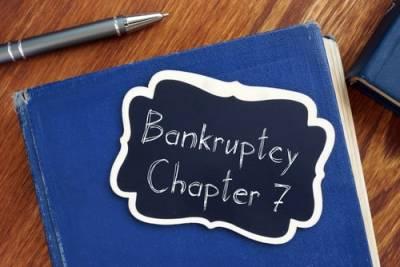What Is the Process Followed During a Chapter 7 Bankruptcy?
 There are multiple options available to those who are struggling with debts. In many cases, bankruptcy is the best way to eliminate debt, and Chapter 7 bankruptcy is often the preferred option. This type of bankruptcy will allow most debts to be completely eliminated within a few months. However, filing for bankruptcy can be a complex process, and it is crucial to work with a skilled attorney to ensure that all of your requirements will be met. By understanding the basics of the Chapter 7 bankruptcy process, you can be sure you will be fully prepared to take the correct steps to eliminate your debts.
There are multiple options available to those who are struggling with debts. In many cases, bankruptcy is the best way to eliminate debt, and Chapter 7 bankruptcy is often the preferred option. This type of bankruptcy will allow most debts to be completely eliminated within a few months. However, filing for bankruptcy can be a complex process, and it is crucial to work with a skilled attorney to ensure that all of your requirements will be met. By understanding the basics of the Chapter 7 bankruptcy process, you can be sure you will be fully prepared to take the correct steps to eliminate your debts.
Steps Followed in a Chapter 7 Bankruptcy Case
Prior to filing for Chapter 7, you will need to gather all of the necessary documentation. This will include information about your income, the assets you own, and all of your debts. Pay stubs, tax returns, and other documents can be used to show the income you earn and ensure that you pass the means test to qualify for Chapter 7. Listing all of your assets will help determine what is exempt from liquidation and what assets you may be required to turn over during the bankruptcy process. By listing all of the debts you owe, you can ensure that the requirement to repay these debts will be discharged once you have completed the bankruptcy process.
Once you are prepared to file for bankruptcy, you will need to complete the following steps:
-
Credit counseling - Within 180 days before filing for bankruptcy, you will be required to take a credit counseling course from an approved provider. Once you have completed this course, you will receive a certificate of completion that will be filed along with your bankruptcy petition.
-
Bankruptcy petition - The bankruptcy process officially begins when you file a petition for bankruptcy with your local bankruptcy court. This petition will include all of the necessary forms detailing that you have met the eligibility requirements and listing your income, assets, and debts. After filing your petition, the court will put an automatic stay on your creditors, and they will not be allowed to contact you or take any actions against you during your bankruptcy case.
-
Meeting of creditors - Around one month after filing for bankruptcy, a meeting will be held in which the bankruptcy trustee assigned to your case will review the information provided to ensure that everything is in order. This is known as the "341 meeting," since it is addressed in section 341 of the U.S. Bankruptcy Code. Even though it is known as the meeting of creditors, most of the time, creditors will not actually be present. The meeting will usually be completed in just a few minutes.
-
Debtor education - Before the bankruptcy process can be completed, you will be required to take a second educational course that will focus on managing your finances and avoiding problems with debt going forward.
-
Debt discharge - Around three to four months after you filed your bankruptcy petition, the trustee will send a notice that your debts have been discharged. Your case will then be closed, and you will no longer be obligated to repay these debts.
Contact Our New Braunfels Chapter 7 Bankruptcy Lawyer
Filing for bankruptcy can be a complex process, and it is important to have skilled legal representation on your side. At the Law Offices of Chance M. McGhee, our Schertz bankruptcy lawyer has extensive experience handling multiple types of bankruptcy cases, and we can help you navigate the bankruptcy process. Call us today at 210-342-3400 to arrange a free consultation and learn more about how we can assist you.
Sources:
https://www.uscourts.gov/services-forms/bankruptcy/bankruptcy-basics/chapter-7-bankruptcy-basics
https://www.txs.uscourts.gov/page/voluntary-chapter-7-bankruptcy-information
https://www.uscourts.gov/sites/default/files/b_2000.pdf






